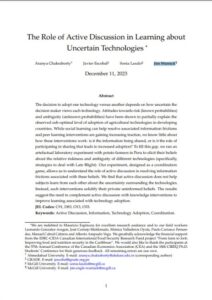The role of active discussion in learning about uncertain technologies
| Year | : | 2024 |
|---|---|---|
| Author/s | : | Aranya Chakraborty, Javier Escobal, Sonia Laszlo, Jim Warnick |
| Area/s | : | Rural development and agriculture |
Chakraborty, A., Escobal, J., Laszlo, S. y Warnick, J. (2024). The role of active discussion in learning about uncertain technologies.
The decision to adopt one technology versus another depends on how uncertain the decision maker views each technology. Attitudes towards risk (known probabilities) and ambiguity (unknown probabilities) have been shown to partially explain the observed sub-optimal level of adoption of agricultural technologies in developing countries. While social learning can help resolve associated information frictions and peer learning interventions are gaining increasing traction, we know little about how these interventions work: is it the information being shared, or is it the role of participating in sharing that leads to increased adoption? To fill this gap, researchers ran an artefactual laboratory experiment with potato farmers in Peru to elicit their beliefs about the relative riskiness and ambiguity of different technologies (specifically, strategies to deal with Late Blight). The experiment, designed as a coordination game, allows us to understand the role of active discussion in resolving information frictions associated with these beliefs. Researchers find that active discussion does not help subjects learn from each other about the uncertainty surrounding the technologies. Instead, such interventions solidify their private uninformed beliefs. The results suggest the need to complement active discussion with knowledge interventions to improve learning associated with technology adoption.






